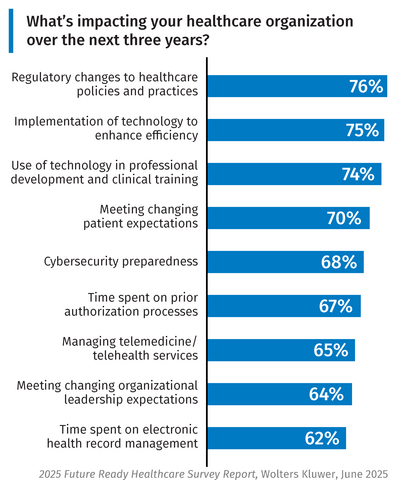Financial News
Wolters Kluwer Future Ready Healthcare Survey Report Reveals Significant Opportunity for Healthcare GenAI—If Health Systems Can Overcome the Readiness Gap
Healthcare professionals see generative AI (GenAI) as key to solving sustainability problems, including the workforce crisis. But many organizations remain unprepared to implement it effectively.
The new 2025 Future Ready Healthcare Survey Report from Wolters Kluwer Health, conducted in partnership with the independent marketing research firm Ipsos, reveals that while healthcare professionals widely recognize the transformative potential of generative AI (GenAI), most organizations are not yet ready to harness its full value.
This press release features multimedia. View the full release here: https://www.businesswire.com/news/home/20250603704329/en/

According to the Wolters Kluwer 2025 Future Ready Healthcare Survey Report, healthcare organization leaders are focusing on the basics to keep the enterprise running: GenAI-driven technologies are likely to be part of the solution for longstanding challenges, such as addressing the burdens of prior authorizations (67%), electronic health record (EHR) management (62%), cybersecurity preparedness (68%), and supporting telehealth/virtual care programs (65%). Regulatory challenges to healthcare policies and practices top their list at 76%.
The survey identifies strong enthusiasm for using GenAI to address the current challenges of workforce shortages, burnout, high healthcare costs, and rising administrative burdens, as well as keen interest in leveraging GenAI to achieve the next level of innovation and efficiency across the enterprise.
However, the data also shows a clear disconnect between what organizations say they want to achieve with GenAI and how prepared they are to deliver on that promise. For example, while 80% of respondents cited “optimizing workflows” as a top organizational goal, only 63% feel prepared to use GenAI to do so.
“GenAI has the potential to be a powerful tool for supporting sustainability in healthcare organizations right now, as well as preparing them for a more efficient future,” said Greg Samios, CEO of Wolters Kluwer Health. “The challenge is developing a strategy that can both optimize the current state in a highly volatile environment and simultaneously equip organizations with the digital capabilities they need to remain competitive over the next several years. Right now, organizations are at risk of falling behind unless they take a more cohesive approach to making GenAI standardized, scalable, and impactful.”
Key Findings:
- Nurse staffing and workforce concerns are at the top of the priority list for health GenAI applications: 85% of respondents cited “recruiting/retaining nursing staff” as a top priority, while 76% identified “reducing clinician burnout” as a main concern.
- Leaders are focusing on the basics to keep the enterprise running: GenAI-driven technologies are likely to be part of the solution for longstanding challenges, such as addressing the burdens of prior authorizations (67%), electronic health record (EHR) management (62%), cybersecurity preparedness (68%), and supporting telehealth/virtual care programs (65%).
- But clinical staff expect more from the GenAI revolution: In qualitative responses, participants said they understand and acknowledge the need for workflow optimization but also want to see innovative capabilities such as ambient listening, clinical decision support leveraging GenAI, and assistance with communication and documentation utilizing GenAI.
- Formal GenAI policies and guidance are scarce: Only 18% of respondents were aware of formal organizational policies governing GenAI use, and only 1 in 5 reported being required to take structured training.
- As a result, concerns about appropriate implementation persist: More than half (57%) believe that overreliance on GenAI may erode clinical decision-making skills, while 55% are concerned that lack of transparency around GenAI’s potential role in making diagnoses could contribute to unclear reasoning behind patient-facing decisions.
“To successfully integrate GenAI, organizations must recognize its current limitations, as well as anticipate its realistic evolution and the regulatory landscape,” said Dr. Peter Bonis, Chief Medical Officer, Wolters Kluwer Health. “It is also vital to select GenAI applications that align with both clinical and financial goals while fitting into existing workflows. Establishing robust and ongoing governance will be essential to succeed.”
About the Wolters Kluwer 2025 Future Ready Healthcare Survey Report
The 2025 Future Ready Healthcare Survey Report is based on a nationally representative survey conducted by Ipsos, an independent marketing research firm, in early 2025. Respondents included physicians, nurses, pharmacists, allied health professionals, administrators, and medical librarians across the US. Download the 2025 Future Ready Healthcare Survey Report to read more.
About Wolters Kluwer
Wolters Kluwer (EURONEXT: WKL) is a global leader in information, software solutions and services for professionals in healthcare; tax and accounting; financial and corporate compliance; legal and regulatory; corporate performance and ESG. We help our customers make critical decisions every day by providing expert solutions that combine deep domain knowledge with technology and services.
Wolters Kluwer reported 2024 annual revenues of €5.9 billion. The group serves customers in over 180 countries, maintains operations in over 40 countries, and employs approximately 21,600 people worldwide. The company is headquartered in Alphen aan den Rijn, the Netherlands.
For more information, visit www.wolterskluwer.com, follow us on LinkedIn, Facebook, YouTube and Instagram.
View source version on businesswire.com: https://www.businesswire.com/news/home/20250603704329/en/
Wolters Kluwer Health/Ipsos survey reveals most healthcare organizations are not yet ready to harness the full value of GenAI, despite interest among professionals.
Contacts
Media Contact
André Rebelo
Director, External Communications
Wolters Kluwer Health
+1 (781) 392-2411
andre.rebelo@wolterskluwer.com
More News
View More




Recent Quotes
View MoreQuotes delayed at least 20 minutes.
By accessing this page, you agree to the Privacy Policy and Terms Of Service.



